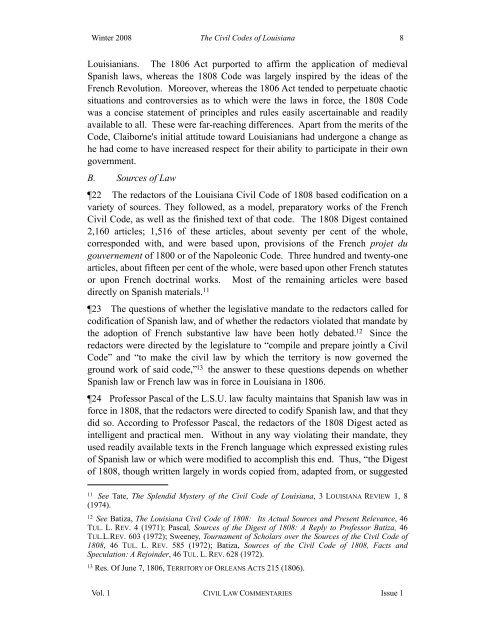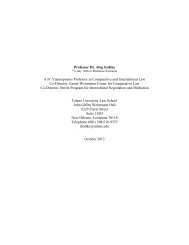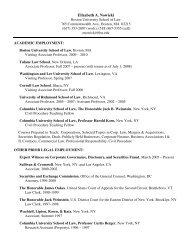Civil Codes of Louisiana - Tulane Law School - Tulane University
Civil Codes of Louisiana - Tulane Law School - Tulane University
Civil Codes of Louisiana - Tulane Law School - Tulane University
Create successful ePaper yourself
Turn your PDF publications into a flip-book with our unique Google optimized e-Paper software.
Winter 2008 The <strong>Civil</strong> <strong>Codes</strong> <strong>of</strong> <strong>Louisiana</strong> 8<br />
Louisianians. The 1806 Act purported to affirm the application <strong>of</strong> medieval<br />
Spanish laws, whereas the 1808 Code was largely inspired by the ideas <strong>of</strong> the<br />
French Revolution. Moreover, whereas the 1806 Act tended to perpetuate chaotic<br />
situations and controversies as to which were the laws in force, the 1808 Code<br />
was a concise statement <strong>of</strong> principles and rules easily ascertainable and readily<br />
available to all. These were far-reaching differences. Apart from the merits <strong>of</strong> the<br />
Code, Claiborne's initial attitude toward Louisianians had undergone a change as<br />
he had come to have increased respect for their ability to participate in their own<br />
government.<br />
B. Sources <strong>of</strong> <strong>Law</strong><br />
22 The redactors <strong>of</strong> the <strong>Louisiana</strong> <strong>Civil</strong> Code <strong>of</strong> 1808 based codification on a<br />
variety <strong>of</strong> sources. They followed, as a model, preparatory works <strong>of</strong> the French<br />
<strong>Civil</strong> Code, as well as the finished text <strong>of</strong> that code. The 1808 Digest contained<br />
2,160 articles; 1,516 <strong>of</strong> these articles, about seventy per cent <strong>of</strong> the whole,<br />
corresponded with, and were based upon, provisions <strong>of</strong> the French projet du<br />
gouvernement <strong>of</strong> 1800 or <strong>of</strong> the Napoleonic Code. Three hundred and twenty-one<br />
articles, about fifteen per cent <strong>of</strong> the whole, were based upon other French statutes<br />
or upon French doctrinal works. Most <strong>of</strong> the remaining articles were based<br />
directly on Spanish materials. 11<br />
23 The questions <strong>of</strong> whether the legislative mandate to the redactors called for<br />
codification <strong>of</strong> Spanish law, and <strong>of</strong> whether the redactors violated that mandate by<br />
the adoption <strong>of</strong> French substantive law have been hotly debated. 12 Since the<br />
redactors were directed by the legislature to “compile and prepare jointly a <strong>Civil</strong><br />
Code” and “to make the civil law by which the territory is now governed the<br />
ground work <strong>of</strong> said code,” 13 the answer to these questions depends on whether<br />
Spanish law or French law was in force in <strong>Louisiana</strong> in 1806.<br />
24 Pr<strong>of</strong>essor Pascal <strong>of</strong> the L.S.U. law faculty maintains that Spanish law was in<br />
force in 1808, that the redactors were directed to codify Spanish law, and that they<br />
did so. According to Pr<strong>of</strong>essor Pascal, the redactors <strong>of</strong> the 1808 Digest acted as<br />
intelligent and practical men. Without in any way violating their mandate, they<br />
used readily available texts in the French language which expressed existing rules<br />
<strong>of</strong> Spanish law or which were modified to accomplish this end. Thus, “the Digest<br />
<strong>of</strong> 1808, though written largely in words copied from, adapted from, or suggested<br />
11 See Tate, The Splendid Mystery <strong>of</strong> the <strong>Civil</strong> Code <strong>of</strong> <strong>Louisiana</strong>, 3 LOUISIANA REVIEW 1, 8<br />
(1974).<br />
12 See Batiza, The <strong>Louisiana</strong> <strong>Civil</strong> Code <strong>of</strong> 1808: Its Actual Sources and Present Relevance, 46<br />
TUL. L. REV. 4 (1971); Pascal, Sources <strong>of</strong> the Digest <strong>of</strong> 1808: A Reply to Pr<strong>of</strong>essor Batiza, 46<br />
TUL.L.REV. 603 (1972); Sweeney, Tournament <strong>of</strong> Scholars over the Sources <strong>of</strong> the <strong>Civil</strong> Code <strong>of</strong><br />
1808, 46 TUL. L. REV. 585 (1972); Batiza, Sources <strong>of</strong> the <strong>Civil</strong> Code <strong>of</strong> 1808, Facts and<br />
Speculation: A Rejoinder, 46 TUL. L. REV. 628 (1972).<br />
13 Res. Of June 7, 1806, TERRITORY OF ORLEANS ACTS 215 (1806).<br />
Vol. 1 CIVIL LAW COMMENTARIES Issue 1





